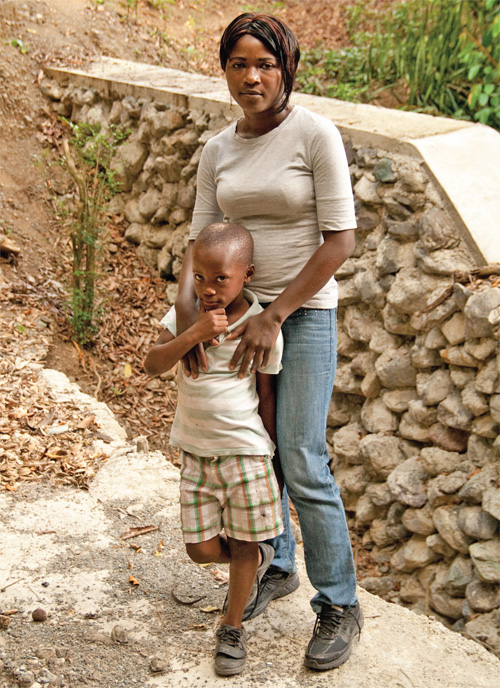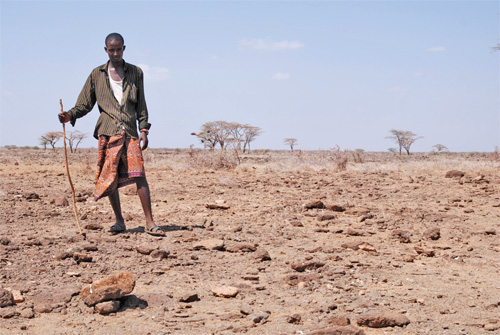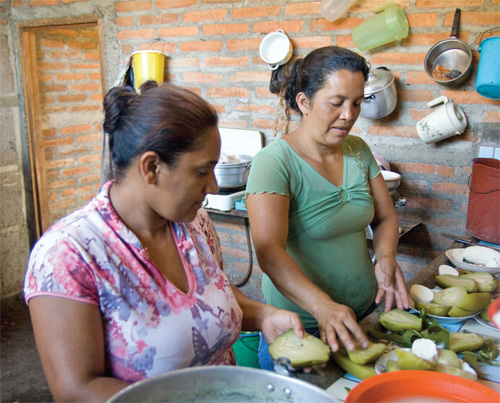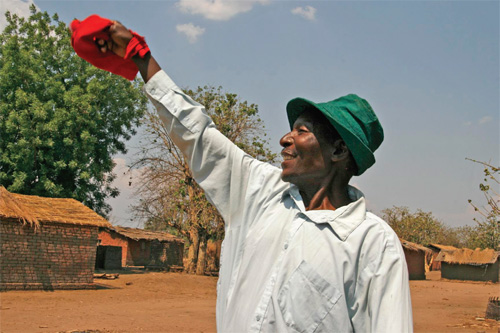by Fern Shaw | Nov 28, 2011 | Uncategorized
Christian Aid would like to thank all the people who have chosen to buy AquAid water coolers, water dispensers and bottled water.

By choosing AquAid, you have helped to improve and often save the lives of the world’s poorest people. AquAid donate 10p to Christian Aid for every 19 litre bottle of water that they sell and donate £50 for every new water cooler they install when a Christian Aid supporter has made the order. The money raised by AquAid is used specifically for water projects around the world; helping to bring clean water and sanitation and supporting irrigation and flood protection projects. One of the places to benefit is the slum settlement of Matopeni in the Kenyan capital, Nairobi. Without clean water or working drains, conditions in the small slum were so unsanitary that life-threatening diseases like malaria and diarrhoea were common. In July 2010, Christian Aid partner Maji na Ufanisi began work to improve the slum’s drains and provide clean water for residents. Members of the local community helped to build the new water and sanitation facilities. The slum’s residents report little illness since the drains were completed. Lydia Kithuku, whose daughters Catherine and Everlyne campaigned to bring clean water and sanitation to Matopeni along with their friend Veronica Milla, says: ‘It is a very big change in terms of diseases like malaria and diarrhoea.’ You can meet the people who are benefiting from this work by watching this video: aquaidwater coolers.co.uk/ why-we-do-it/christian-aid Once again, thank you for choosing AquAid and for supporting Christian Aid’s work with poor communities around the world. If you are not already an AquAid customer and would like to become one, simply quote this article when you order AquAid water coolers or water dispensers and £50 will be donated for each new cooler installed. 10p will then be donated for every 19-litre bottle of water you buy.
AquAid now supplies water coolers to a large number of offices and homes in your area. If you would like further information please call 01223 508 109 or fax 01223 508 110. If you would like further information about Christian Aid’s work, please call us on 020 7523 2463 or go to christianaid.org.uk/aquaid
by Fern Shaw | Nov 22, 2011 | Uncategorized
AquAid Water Coolers is proud to sponsor Christian Aid’s water-related projects around the world. Thanks to your support, AquAid Water Coolers has been able to donate over £2 million to help Christian Aid help those in need.
Sleeping safer at night
Families in the community of Somerset, in St Thomas (one of the poorest parishes in Jamaica), were suffering from regular flooding and mudslides. New Christian Aid funded check dams are now helping to protect homes and help the community to sleep safer at night. Jamaica’s coastal areas are highly vulnerable to natural hazards such as hurricanes, storm surges and landslides. Last year, 12 people died and thousands were forced from their homes as tropical storm Nicole swept across the island.
 Climate change is heightening the island’s vulnerability to disaster. A report by the Planning Institute of Jamaica concluded that the country ‘is likely to see increases in extreme weather events such as hurricanes and flood rains’, creating ‘increased risk to coastal housing and infrastructure and loss of coastal habitats and species’. In a country where the bulk of the population, roads, airports and economic activity are clustered around the coastline, the impact of more frequent storms and flooding on this already poor island could be devastating. Protecting the community Marsha Graham has lived with the impact. Mud and flood waters often came into her home following heavy rains. But, with support from Christian Aid partner the Women’s Resource and Outreach Centre (WROC), members of her community got together to carry stones and cement to build check dams. The dams now catch the flood water and help prevent flooding and landslides. The dams have shown their effectiveness by helping to prevent damage when tropical storm Nicole came across Marsha’s village. ‘Now I can sleep much more relaxed when it’s raining, not having to think about things,’ says Marsha. Dealing with climate change In the coming pages, we look at how your donations through AquAid Water Coolers are helping to protect communities around the world from the worst effects of climate change.
Climate change is heightening the island’s vulnerability to disaster. A report by the Planning Institute of Jamaica concluded that the country ‘is likely to see increases in extreme weather events such as hurricanes and flood rains’, creating ‘increased risk to coastal housing and infrastructure and loss of coastal habitats and species’. In a country where the bulk of the population, roads, airports and economic activity are clustered around the coastline, the impact of more frequent storms and flooding on this already poor island could be devastating. Protecting the community Marsha Graham has lived with the impact. Mud and flood waters often came into her home following heavy rains. But, with support from Christian Aid partner the Women’s Resource and Outreach Centre (WROC), members of her community got together to carry stones and cement to build check dams. The dams now catch the flood water and help prevent flooding and landslides. The dams have shown their effectiveness by helping to prevent damage when tropical storm Nicole came across Marsha’s village. ‘Now I can sleep much more relaxed when it’s raining, not having to think about things,’ says Marsha. Dealing with climate change In the coming pages, we look at how your donations through AquAid Water Coolers are helping to protect communities around the world from the worst effects of climate change.
Emergency appeal for East Africa
Christian Aid has launched an emergency appeal to help people affected by the food crisis is east Africa.
Having experienced the worst drought in 60 years, millions of people across Kenya, Ethiopia and Somalia are facing what is perhaps the most severe food crisis in the world today. Christian Aid staff in the region are reporting widespread cases of malnutrition and of people begging for water on the side of the road. The effects of the crisis have been exacerbated by the displacement of people caused by conflict in Somalia. Christian Aid partners in the region are providing wideranging emergency relief. This includes supplying food for families who are not reached by the World Food Programme and providing extra nutritional support for the most vulnerable, such as children and Emergency appeal for East Africa pregnant mothers. They have also been constructing additional water points and supplying water to villages experiencing the worst of the drought conditions. Further aid is going towards helping local communities feed their livestock, sustain farming and withstand the impact of this and future droughts. To make a contribution towards the vital work of Christian Aid at this time of crisis, please visit christianaid.org.uk or call Brendan Brosnan on 020 7523 2474.

Crops the floods cannot spoil
Many Nicaraguan farmers lose their crops in frequent floods. A Christian Aid-supported project is helping local people to grow produce that won’t rot even if the fields become waterlogged.
With a long Caribbean coastline, Nicaragua often bears the brunt of the hurricanes and tropical storms that sweep across the Atlantic each winter. It is one of the three countries in the world worst affected by weather catastrophes, and the UN has warned that storms here will only get worse. Nelis lives in the remote riverside village of La Labranza, which is especially prone to flooding. Local people traditionally grow maize and beans, but a lot of this rots in the frequent rainstorms and floods. ‘My maize and beans drown when there’s lots of water. In a bad year like the one we’ve just had, I only get a fraction of the produce I can expect in a good year,’ says Nelis. The Christian Aid-supported Community Movement of Matagalpa (MCM) is working with local people to help them withstand the worst effects of the frequent flooding. In 2009, we reported on the early warning and evacuations carried out by volunteer emergency brigades. Another part of MCM’s work is introducing farmers like Nelis to new flood-resistant crops like chayote, a type of marrow. As chayote grows on raised vines, it can survive being waterlogged for days. ‘Chayote is very new for us, but it’s good to eat,’ says Nelis. ‘You can sow it whenever you want and harvest it when it’s mature.’

Striving for a better future
Salt contamination from encroaching seas is making it harder for many Bangladeshi farmers to grow crops and feed their families. Now, the Christian Aidsupported Shushilan project is helping people in the coastal Satkira district to grow saline-resistant rice.
Bangladesh is on the frontline of climate change. The majority of the country is made up of low lying river deltas, making it exceptionally vulnerable to the rise in sea levels and stronger tidal surges seen across the Bay of Bengal in recent years. The sea waters bring in salt, which contaminates local rivers and farmland. The impact of salination is obvious in the Satkira district of southwest Bangladesh. Salt residue can be seen on the trunks of trees and the leaves on many plants are turning brown. The salty water is killing the fruit trees and severely reducing crop yields, including yields of rice – which is the local people’s staple food. Resistant crops To help people sustain farming, Christian Aid partner Shushilan (which means ‘striving for a better future’) has been distributing seeds that are adapted to grow in this saline environment. The results are extremely promising. Shushilan is also training and equipping families to fatten crabs, which are well suited to the salty water and provide a useful source of food. Improved lives As a Shushilan volunteer, Selina Begum has helped lead the saline seed project in her village. ‘With the money I get from selling the rice at the local market, I want to start a clinic for animals,’ said Selina. ‘I have received veterinary training from Shushilan. As there are no clinics in this area, starting one would allow me to do more to support my family and the community.’

Early warnings save lives
Lack of warning was leaving people in the riverside village of Tombondela, in southern Malawi, with too little time to escape the frequent floods. Thanks to support from Christian Aid, they are now prepared for the worst.
As rainfall has become more erratic and unpredictable, the region of Chikwawa in southern Malawi is experiencing more severe flooding. ‘By the time we were told the floods were on their way, they were already here,’ said an elderly villager from the riverside community of Tombondela. ‘We found it difficult to run away in time and we lost our food and property.’ With funding and training from Christian Aid partner the Evangelical Association of Malawi (EAM), the villagers have now set up a civil protection committee. EAM helped to install rain gauges and hydrometers upstream, to measure rising water levels and anticipate floods. Volunteers are on hand to send warnings to the committee, on mobile phones provided by EAM. Once the alert is given, the committee can put its new evacuation plans into action, using megaphones to warn villagers and helping to get the most vulnerable people to higher ground. ‘We have the confidence to protect ourselves from floods in the future,’ said a villager.

by Fern Shaw | Sep 30, 2011 | Uncategorized
Cleaner slum brings hope for the future
Christian Aid would like to thank all the people who have chosen to buy Aquaid water coolers, water dispensers and bottled water. By choosing Aquaid, you have helped to improve and often save the lives of the world’s poorest people. This is because Aquaid donate 10p to Christian Aid for every 19 litre bottle of water that they sell and donate £50 for every new water cooler they install when a Christian Aid supporter has made the order.The money raised by Aquaid is used specifically for water projects around the world; helping to bring clean water and sanitation to places like the slum settlement of Matopeni in the Kenyan capital, Nairobi. You can meet the people who are benefiting from this work by watching this video: https://www.aquaidwatercoolers.co.uk/why-we-do-it/christian-aid
Below is an update on the progress of this project
Just over one year ago, the residents of Matopeni in the east of Nairobi faced a daily struggle to survive. Without clean water or working drains, conditions in the small slum were so unsanitary that life-threatening diseases were common. But in July 2010 Christian Aid partner Maji na Ufanisi began work to improve the slum’s drains and provide clean water for residents. At the same time, the local government agreed to fund a new sanitation block with shower and toilet facilities. Today the slum’s residents report little illness since the drains were completed in November. Lydia Kithuku – whose daughters Catherine and Everlyne campaigned to bring clean water and sanitation to Matopeni along with their friend Veronica Milla – says, ‘It is a very big change in terms of diseases like malaria and diarrhoea.’
Alongside improving Matopeni’s infrastructure, Maji na Ufanisi has trained community members in advocacy and leadership giving them the confidence to ensure their government provides the services they need. So when the community decided they needed a water tank to see them through the last few months until the pipes that Maji na Ufanisi are laying are completed, Veronica Milla successfully lobbied the community’s MP to provide one. The project has reinforced Matopeni’s community spirit with residents leading work since it began. Working together they have cleared waste, worked with Maji na Ufanisi to make space for the new drains and laboured on the project, investing time and energy into making it a success. They have seen that they can drive their own future and now have the skills to do so. And a recent visit to Kiambiu slum which was organised for members of Matopeni’s Arise and Shine women’s group and communities from other slums around Nairobi has only reinforced this. Like Matopeni’s community, Kiambiu’s residents lived for years with the constant threat of eviction, relying on the little casual work that is available in Nairobi for income. But using money saved through their own water and sanitation project they bought their own land on the outskirts of Nairobi where they will build homes, roads and other infrastructure. ‘They thought of a future plan,’ says Everlyne Kithuku. ‘Now they are planning to build houses for each and every member of the group. It was really a challenge for us – that we could buy some land and set up small businesses and become self-employed.’
Once again, thank you for choosing Aquaid and for helping Christian Aid in our mission to end poverty. If you are not already an Aquaid customer and would like to become one, simply quote this article when you order Aquaid water coolers or water dispensers and £50 will be donated for each new cooler installed. 10p will then be donated for every 19-litre bottle of water you buy.


 Climate change is heightening the island’s vulnerability to disaster. A report by the Planning Institute of Jamaica concluded that the country ‘is likely to see increases in extreme weather events such as hurricanes and flood rains’, creating ‘increased risk to coastal housing and infrastructure and loss of coastal habitats and species’. In a country where the bulk of the population, roads, airports and economic activity are clustered around the coastline, the impact of more frequent storms and flooding on this already poor island could be devastating. Protecting the community Marsha Graham has lived with the impact. Mud and flood waters often came into her home following heavy rains. But, with support from Christian Aid partner the Women’s Resource and Outreach Centre (WROC), members of her community got together to carry stones and cement to build check dams. The dams now catch the flood water and help prevent flooding and landslides. The dams have shown their effectiveness by helping to prevent damage when tropical storm Nicole came across Marsha’s village. ‘Now I can sleep much more relaxed when it’s raining, not having to think about things,’ says Marsha. Dealing with climate change In the coming pages, we look at how your donations through
Climate change is heightening the island’s vulnerability to disaster. A report by the Planning Institute of Jamaica concluded that the country ‘is likely to see increases in extreme weather events such as hurricanes and flood rains’, creating ‘increased risk to coastal housing and infrastructure and loss of coastal habitats and species’. In a country where the bulk of the population, roads, airports and economic activity are clustered around the coastline, the impact of more frequent storms and flooding on this already poor island could be devastating. Protecting the community Marsha Graham has lived with the impact. Mud and flood waters often came into her home following heavy rains. But, with support from Christian Aid partner the Women’s Resource and Outreach Centre (WROC), members of her community got together to carry stones and cement to build check dams. The dams now catch the flood water and help prevent flooding and landslides. The dams have shown their effectiveness by helping to prevent damage when tropical storm Nicole came across Marsha’s village. ‘Now I can sleep much more relaxed when it’s raining, not having to think about things,’ says Marsha. Dealing with climate change In the coming pages, we look at how your donations through 


